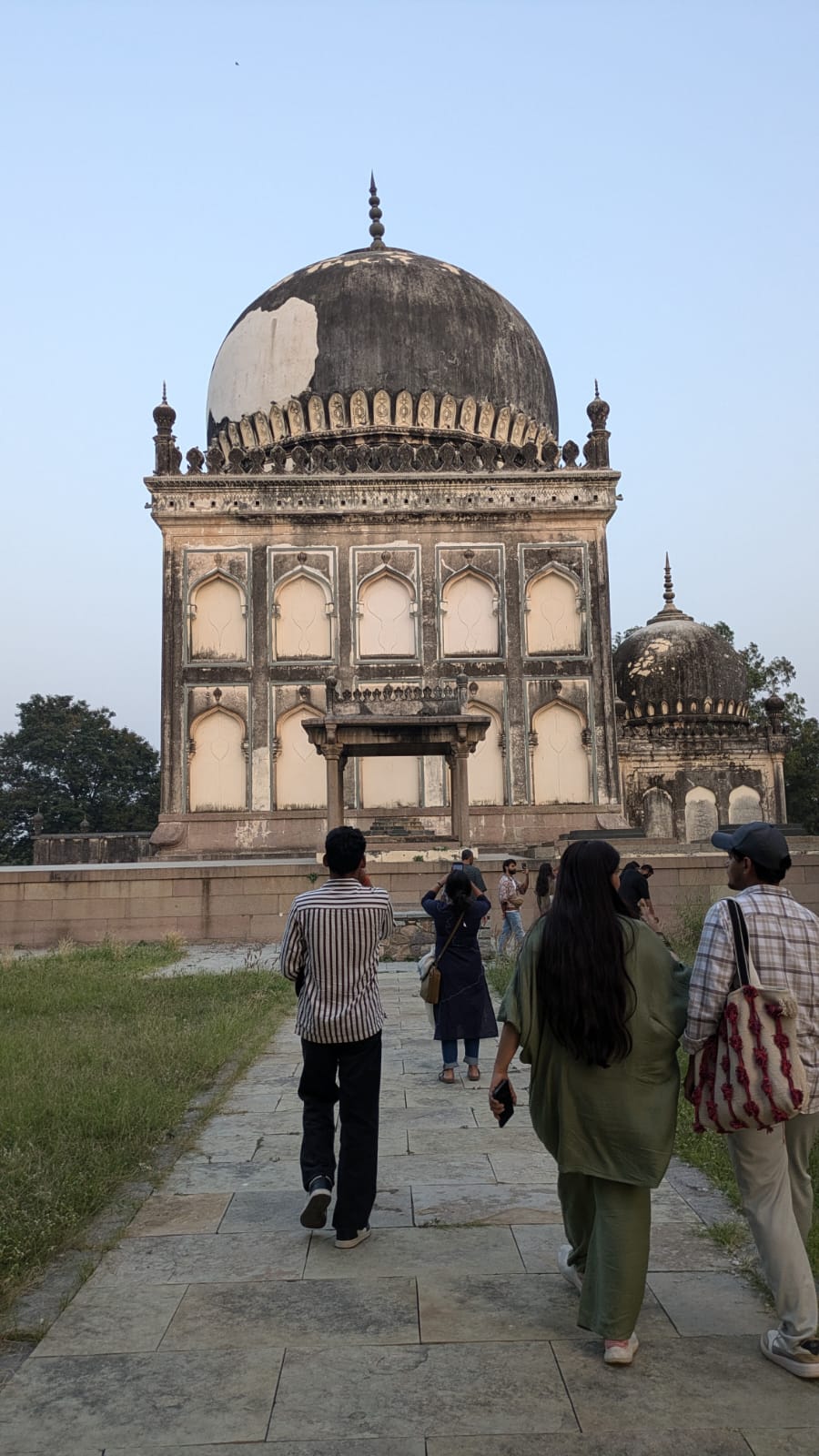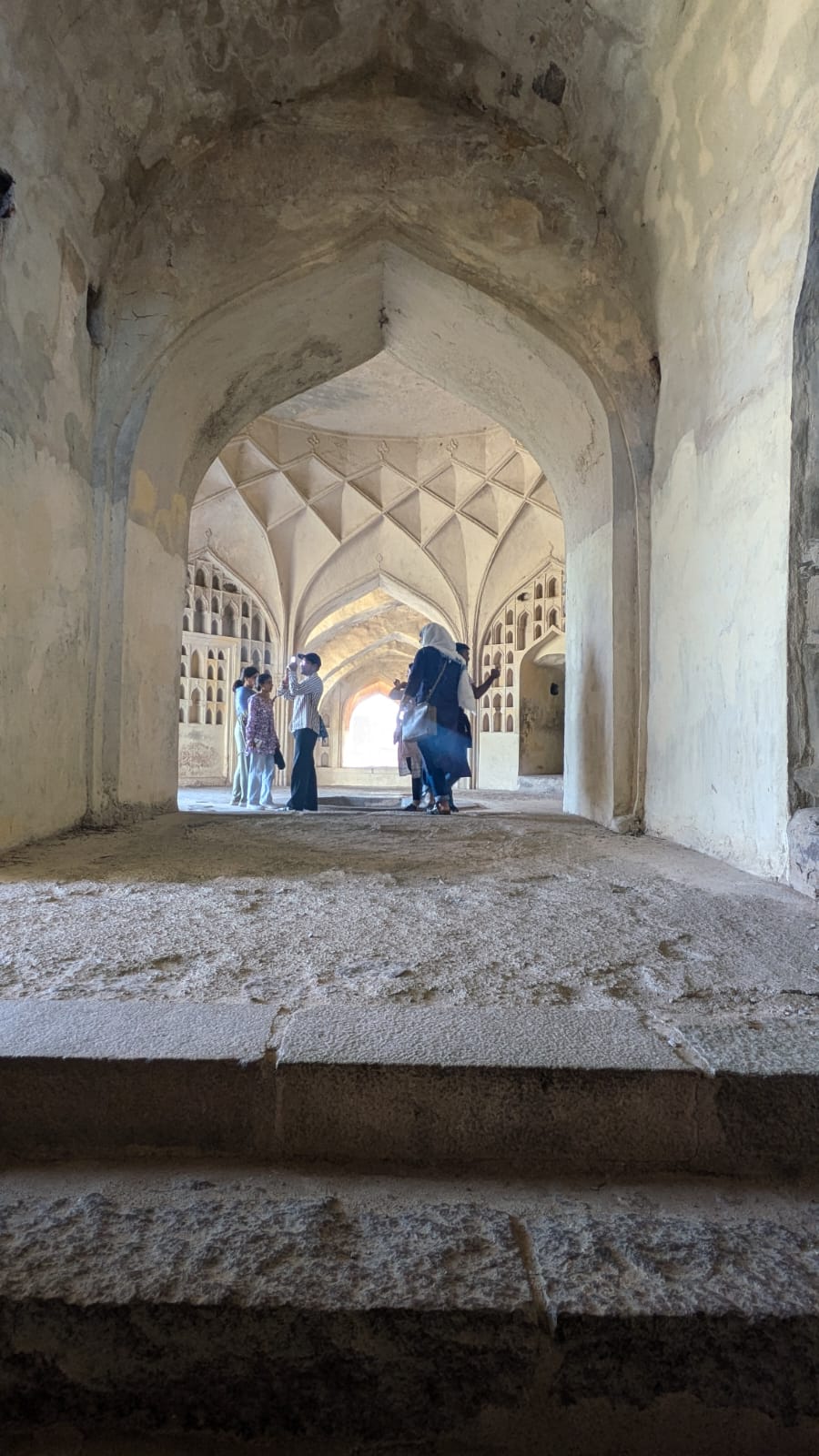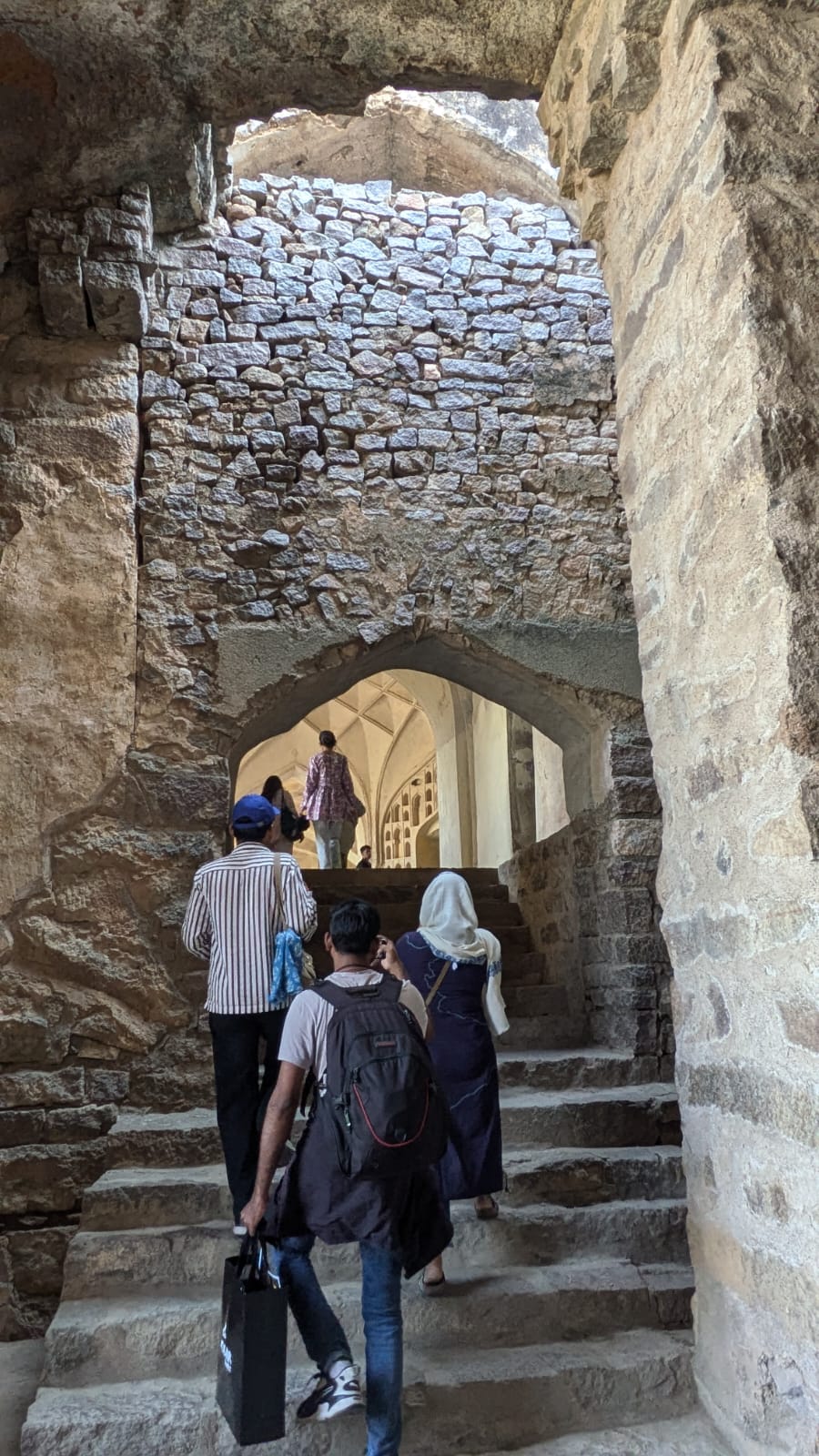Insights into Success in the Corporate Environment

The Department of Management organised a Guest Talk on the topic “The Commercial Real Estate Industry; Trends & Insights” on January 17, 2025. Mr Dibashish Ghosh, Senior Vice President and Country HR Head at Berkadia delivered an insightful session on the transition from Campus to Corporate. With over 18 years of extensive experience in human resources, Mr Ghosh has successfully led global organisations and Indian conglomerates, including GE and Genpact, in key leadership roles. His expertise, spanning organisational culture transformation, change leadership, and talent management, gave professional tips to MBA students by sharing real-world experiences, challenges and strategies for success in the corporate environment.
The session provided a holistic perspective, enabling students to connect theoretical knowledge with real-world applications in the Financial Services and Commercial Real Estate domains. The talk focused on enhancing Real Estate Industry awareness—the trends, challenges, and opportunities; Understanding the Key Financial Components and their integration with real estate investments; Knowledge of Asset classes and opportunities for investing in Commercial Properties; Practical insights into investment and mortgage banking; Impact of Regulatory and economic factors; Networking and mentorship; and Preparation for Corporate Roles.
- Published in Departmental News, News, Paari Current Happenings, paari-guest-lectures
Tech Wizards Claim South Zone Title at Nation Building Competition
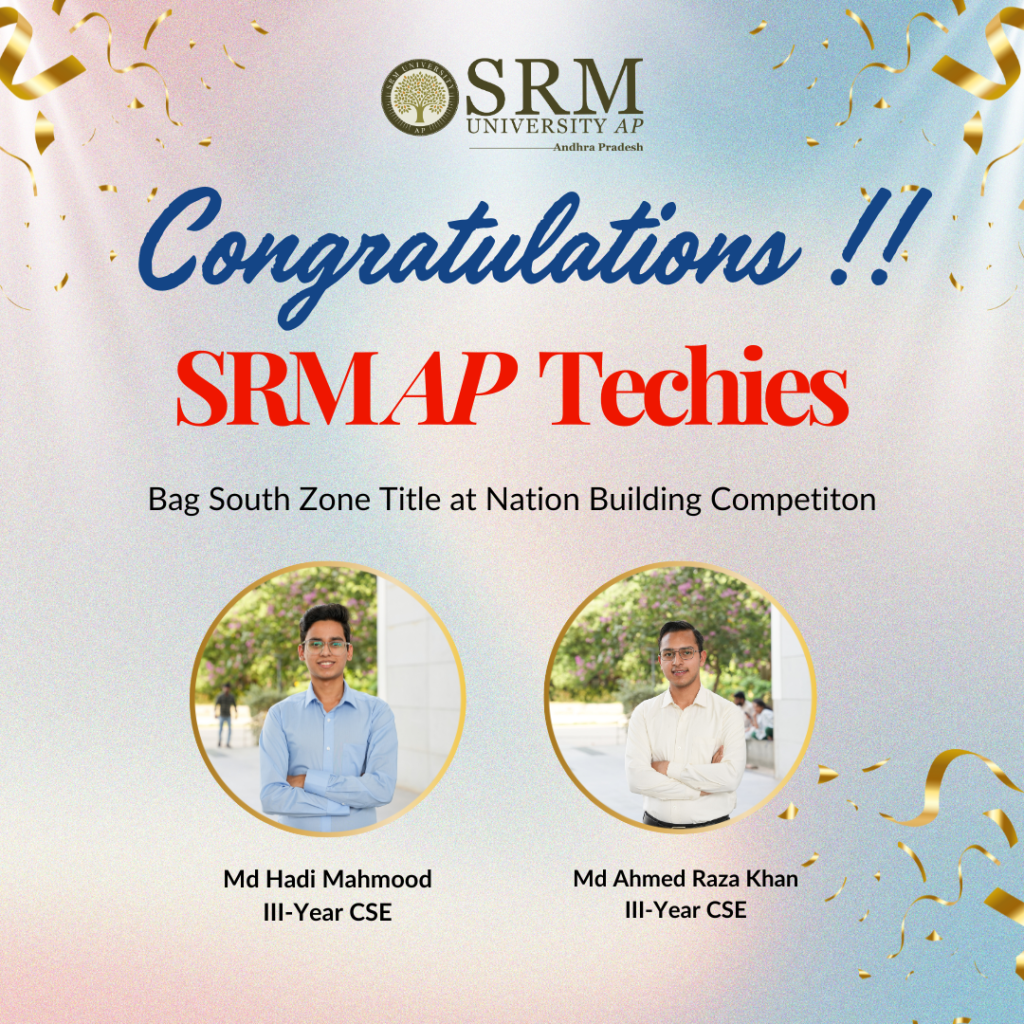
In a world where the potential of GenZs is often questioned, two of our students, Md. Hadi Mahmood and Md Ahmed Raza Khan have proven that their engagement can deliver meaningful change. These III-year BTech CSE students have showcased an inspiring display of their intellect and innovative prowess at the Nation Building Case Study Competition, an annual event that aligns with the “Viksit Bharat” initiative led by Hon’ble Prime Minister Shri. Narendra Modi, inviting college teams from across the nation to develop creative strategies aimed at transforming India into a developed country by 20247.
Here’s an excerpt of their interview:
1. What was the competition/event about?
The NationBuilding Case Study Competition is an annual event organised to inspire young college students to contribute to India’s development by addressing critical national issues. Participants engage in a 2-month-long journey involving multiple rounds, including an online quiz, presentation submissions, zonal finals, and the national finals in New Delhi. The competition is judged by a distinguished panel of experts in the given domain.
This year’s competition, NationBuilding Case Study Competition 2025, focused on the problem statement of identifying the gaps in India’s sports environment. Participants were tasked with studying the sports systems of other countries, analysing their strengths, and drafting a model to achieve India’s vision of hosting and winning 100 medals in the Olympics by 2036. This theme aimed to encourage innovative solutions to elevate India’s standing in global sports and align with the broader goal of nation-building.
2. What place did you secure?
We secured the 1st rank in the South Zone during the third round of the competition, competing against teams from multiple prestigious institutions. This achievement has advanced us to the national finals, where we will compete against the top 2 teams from each of the six zones: North, South, East, North East, West, and Central.
3. How did you find out about the competition?
We discovered this opportunity on the Unstop platform. The NationBuilding Case Study Competition is widely recognised and attracts thousands of teams annually, making it a highly sought-after event for students across India.
4. Who were your competitors
In the South Zone, we competed against 10 teams from premier institutions. The competition was intense, as participants brought innovative solutions to the table, reflecting the high level of talent and dedication among the youth.
5. Your feelings on advancing this far and future aspirations.
We are excited to have advanced to the national finals. Competing against the best teams from across the country is both a challenge and an opportunity to showcase our strategic thinking and problem-solving skills. This competition has allowed us to apply our skills & knowledge to real-world issues, which has been incredibly rewarding. We look forward to the final round and hope to contribute meaningfully to the vision of a developed India.
- Published in CSE NEWS, Departmental News, News, Students Achievements
Developing Organic Thin-Film Transistors into Biosensors

The Department of Electronics and Communication Engineering is proud to announce that Dr Durga Prakash M and his scholar Prasanthi Ms Prasanthi Lingala have their invention titled “An Organic Thin-Film Transistors (OTFTs) with Steep Subthreshold and Ultra-Low Temperature Solution Processing for Label-Free Biosensing” published in the Indian Patent Office Journal with the Application Number: 202541000088. Their research focus on developing an Organic Thin-Film Transistor (OTFT) that is able to work as a biosensor in detecting diseases or for real-time health monitoring.
Abstract
Organic Thin-Film Transistor (OTFT): The name “organic thin-film transistor” (OTFT) refers to a type of transistor that employs organic semiconductor materials in its active layer rather than the more traditional inorganic materials such as silicon. Optical thin-film transistors (OTFTs) are distinguished by their adaptability, low fabrication cost, and optimal applicability for electronic devices that are lightweight and portable. Considering their high sensitivity to changes in the surrounding environment and their compatibility with functionalised layers for the detection of biomolecules, these transistors find widespread application in the field of biosensors.
Explanation of the Research in Layperson’s Terms
Imagine a flexible electronic switch that can be bent, stretched, and used in lightweight devices—this is what an Organic Thin-Film Transistor (OTFT) does! Unlike traditional transistors made from rigid silicon, OTFTs use special organic materials, making them more adaptable for wearable sensors, flexible displays, and medical devices.
The research focuses on how these transistors can be used as biosensors, meaning they can detect tiny changes in the environment, like the presence of certain chemicals or biomolecules. This is important for medical testing, where OTFTs could help develop low-cost, highly sensitive diagnostic tools—imagine a simple patch that can detect diseases from sweat or a flexible sensor for real-time health monitoring! By improving how OTFTs interact with biological substances, the team aims to make them more accurate, efficient, and reliable for next-generation healthcare and wearable technology.

Fig.: Schematic structure of DNTT based OTFT
- Published in Departmental News, ECE NEWS, News, Research News
Theory-Experiment Dialogue on Big Bang Nucleosynthesis

The Department of Physics organised a Department Research Seminar on February 05, 2025, that offered a theoretical expression on Big Bang Nucleosynthesis. The seminar, which unravelled as a theory-experiment dialogue, also delved into interesting topics like Quantum Field Theory and General Relativity. Dr Martin Schaefer, nuclear physicist from the Department of Theoretical Physics Nuclear Physics Institute, Czech Academy of Sciences was the keynote speaker of the session.
The key idea of this session was to understand the means of the Big Bang and the Standard Model Lagrangian Method. Dr Schaefer discussed the nuclear reactions that formed the early universe and had an interaction session with the participating students and scholars.
The workshop was based on ‘Big Bang to Now: Exploring the Origins of the Universe’ with Nuclear Processes during Big Bang Nucleosynthesis. It focused on understanding the universe’s origins and the nuclear processes responsible for its birth during Big Bang nucleosynthesis.
Big Bang Nucleosynthesis (BBN) refers to the process that occurred roughly 10 seconds after the Big Bang when the temperature of the universe dropped enough for atomic nuclei to form. This has led to the creation of stable elements such as helium and lithium isotopes, which played a crucial role in the evolution of the universe. The specific abundance of these elements provides observable imprints in the universe today, helping scientists validate theories like the Hot Big Bang Model and the Standard Model of particle physics.
The study of BBN allows scientists to understand the fundamental forces and nuclear interactions that governed the early universe. Dr Martine Schaefer provided insightful and educative information by helping scientists test the hot Big Bang theory. The session proved to be an incredible platform for scholars, students, and faculty to collaborate and discuss theoretical and experimental physics.
- Published in Departmental News, News, Physics News
MoU with SHRI Opens New Pathways in Medicine
In an effort towards enhancing academic and research capabilities, SRM University-AP and Samishta Hospital and Research Institute (SHRI) formalised an understanding on scientific cooperation in biological sciences and other areas of mutual interest. The MoU signing ceremony that took place at SRM University-AP and was signed by Dr R Premkumar, Registrar- SRM University-AP and Dr Kalyan Chakravarthy, Managing Director-Samistha Hospital and Research Institute, Guntur in the presence of Dr Sandeep and Dr Ravi Teja, Dr Varun, Dr Ramakrishna, Dr Gnana Prakash Doctors from SHRI and Prof. C V Tomy, Dean-School of Engineering and Sciences; Prof. Ranjit Thapa, Dean-Research; Prof. Jayaseelan Murugaiyan, Associate Dean-Sciences (Admission Outreach and Research Collaborations); Assistant Professors at the Department of Biological Sciences-Dr Sutharsan Govindarajan, Dr Anil K Suresh, Dr Prateek Gupta among others.
The MoU will open pathways for collaborative opportunities in research and academics, fostering joint research projects and funding possibilities while also emphasising the importance of skill development through seminars organised by both the institutions.
Registrar Dr R Premkumar highlighted the significance of this partnership and the potential outcomes of the joint venture. Dr Sutharsan Govindarajan thanked the team from Samistha Hospitals and Research Centre for joining hands and taking the phase therapy from bench to bedside. This MoU between the two institutes of eminence aims to create a dynamic environment for innovative research that will benefit not just our institutions but also the society in general.
- Published in Biology News, Departmental News, MoU, News
Field Trip to Hyderabad: A Journey of Education, Culture, and Adventure
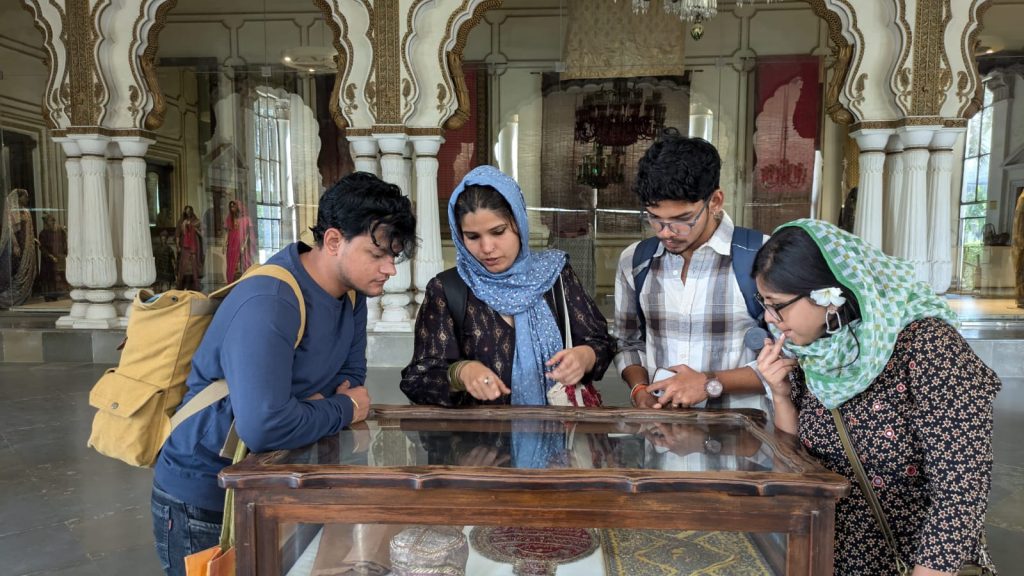
The 5th Semester B.A. History students went on a field trip to Hyderabad as part of their courses ‘Medieval India’ and the ‘Eighteenth Century in Indian History’. Dr Aqsa Agha, Course Coordinator, and Dr Manaswini Sen led the study group to explore the city’s historical and cultural significance, enhancing their learning outside the classroom for the two courses.
The group visited Charminar, exploring the iconic monument and its surrounding bazaars, Golconda Fort, discussing its history and architecture with a Heritage Walk Practitioner from Hyderabad, and finally the Qutb Shahi Tombs and gardens, a standing testament of Indo-Persian architectural excellence.
The field trip provided students with a refined exposure to the diverse culture and history of Hyderabad and the historical context of the evolution of the culture of the city. The students had a wonderful chance to visit the important historical monuments and urban morphology that mark the period of study in the courses on Medieval and Eighteenth-century Indian History.
The field trip fostered a deep understanding of the respective courses, inspiring students to explore beyond books and classrooms.
- Published in Departmental News, History Current Happenings, History News, News
Prof. Stefan Kalkhof on Advancing Biomaterial Design

The Department of Biological Sciences organised an expert talk on “Guiding Biomaterial Design Through the Power of Omics Technologies” by Prof. Stefan Kalkhof on February 05, 2025. Prof. Kalkhof, a distinguished member of the Faculty of Applied Natural Sciences, Coburg University of Applied Sciences, Germany, and Head of the Proteomics Research Group at the Fraunhofer Institute for Cell Therapy and Immunology (IZI), Germany, began the session with an introduction to Coburg University, highlighting its rich academic history and research contributions, followed by a brief overview of the Fraunhofer Institute for Cell Therapy and Immunology (IZI), which is dedicated to developing the medicine of the future through innovative research in cell therapy and immunology.
Prof. Kalkhof’s talk focused on the potential of mass spectrometry-based proteomics and its wide-ranging applications in biomedical research. He emphasised how this advanced technology helps study the structure and function of drug targets, develop cancer-specific drugs, design functional implants, understand bacterial infections, and assess the toxic effects of chemicals.
A significant part of the discourse revolves around bone implants and tissue regeneration. He explained that although bones naturally regenerate, certain conditions, such as Type 2 diabetes and other metabolic disorders, may need bioactive scaffolds to promote healing. These smart scaffolds are designed to stimulate active tissue regeneration.
Prof. Kalkhof also spoke about the importance of proteomics technologies in regenerative medicine. He highlighted how mass spectrometry at the protein level plays a crucial role in healing, diagnostics, and drug development. His discussion extended to bioactive functional implants, a field that offers vast opportunities for materials scientists, chemists, toxicologists, and medical researchers.
The session also covered clinical trials and experimental models used to evaluate bioactive scaffolds, including in vitro and in vivo characterisation, osteoblast cell culture models, and simulation experiments in animal models.
Towards the conclusion of his talk, Prof. Kalkhof provided insights into ongoing projects in regenerative medicine, emphasising the significance of comprehensive analysis for bio-resource-based bioactive scaffolds. He also acknowledged his core research team and their invaluable contributions to these projects. The lecture was followed by an engaging Q&A session, where students and faculty members posed insightful questions about proteomics, biomaterials, and regenerative medicine.
- Published in Biology News, Departmental News, News
Dr Kaur Explores New Frontiers in Mathematics
 Dr Surinder Kaur, Assistant Professor at the Department of Mathematics is making significant contributions to the mathematical community and SRMAP’s research wing, her research on understanding the group rings and addressing challenges such as the isomorphism problem for group algebra through her project has earned her a funding of ₹ 4.28 lakh from the prestigious National Board for Higher Mathematics (NBHM). Dr Kaur’s impressive research work has become a source of inspiration to many. Given below are some details on her project titled, “On the group rings, their unit groups and some related questions”
Dr Surinder Kaur, Assistant Professor at the Department of Mathematics is making significant contributions to the mathematical community and SRMAP’s research wing, her research on understanding the group rings and addressing challenges such as the isomorphism problem for group algebra through her project has earned her a funding of ₹ 4.28 lakh from the prestigious National Board for Higher Mathematics (NBHM). Dr Kaur’s impressive research work has become a source of inspiration to many. Given below are some details on her project titled, “On the group rings, their unit groups and some related questions”
A Brief Description of the Project
In this project, we aim at obtaining the structure and generators of the unit group of some group rings with a focus on answering the normal complement problem for them. Our further goal is to solve the celebrated isomorphism problem for group algebras of certain classes of groups, especially the twisted version of this problem for group algebras of nilpotency class at least 3. We also plan to look into certain questions in the representation theory of association schemes that are driven by what happens for group algebras.
Explanation of Research Objectives in layperson’s terms
In the last century, the work of E. Noether, F.G. Frobenius and R. Brauer have established that group rings play a central role in the development of representation theory. Further investigations indicated that these objects also have a great influence on the study of other areas of Mathematics like algebraic number theory, algebraic K-theory and algebraic topology. Moreover, the vital role it has played in the recent development of homological algebra and algebraic coding theory is worth acknowledgement.
- Published in Departmental News, Faculty Achievements, Math News, News
6-Day Workshop cum Mini-Symposium on PDE Successfully Concludes
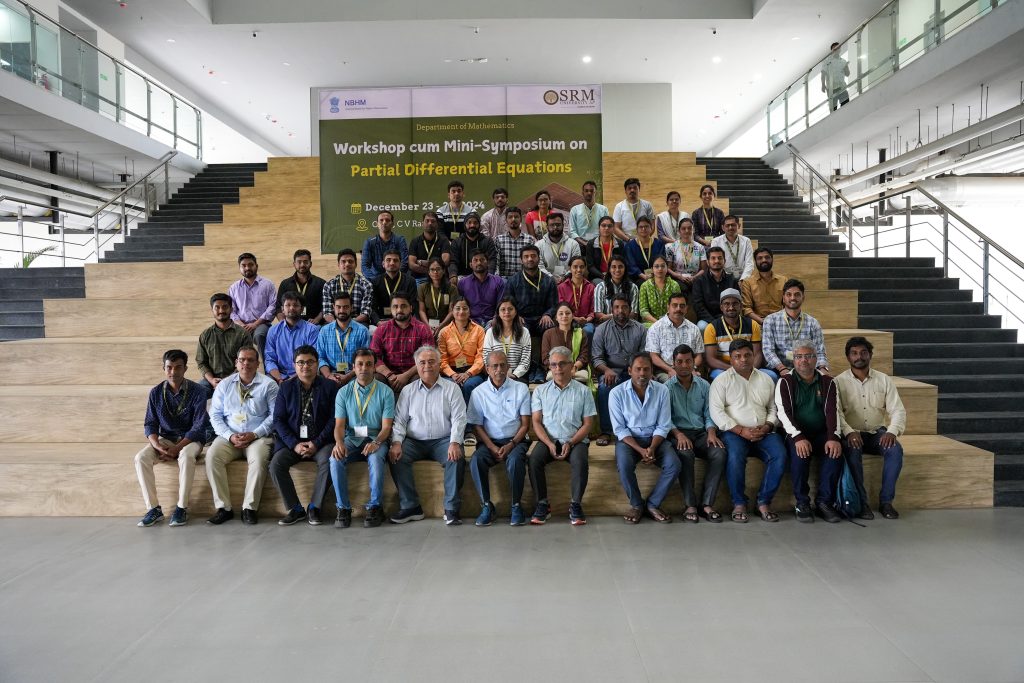
The Department of Mathematics successfully hosted a 6-day Workshop cum Mini-Symposium on Partial Differential Equations (PDE) from December 23 to 28, 2024, with generous financial support from the National Board for Higher Mathematics (NBHM). The event aimed to bridge theoretical foundations and cutting-edge applications of PDEs, fostering academic dialogue among researchers, scholars, and students.
The Workshop held on the theme “Basics of regularity theory of elliptic partial differential equations” featured sessions by subject experts including Prof. A. Adimurthi, Visiting Faculty, Department of Mathematics and Statistics, IIT Kanpur; Dr Karthik Adimurthi, Reader, Tata Institute of Fundamental Research Centre for Applicable Mathematics, Bangalore and Prof. Prosenjit Roy, Professor, Department of Mathematics, IIT Kanpur.
Themed “Applied Mathematics Symposium on Differential Equations: Theory, Computation, and Beyond”, the mini-symposium featured insightful talks by Prof. Mohit Dalwadi, Associate Professor in Applied Mathematics, Mathematical Institute, University of Oxford; Dr Satyajit Pramanik, Assistant Professor, Department of Mathematics, IIT Guwahati and Dr Moitri Sen, Assistant Professor, Department of Mathematics, NIT Patna. These experts delivered lectures on advanced topics, including elliptic PDE theory, computational methods, and interdisciplinary applications.
The primary aim was to provide participants with a comprehensive understanding of the abstract theory of elliptic partial differential equations, emphasising both foundational principles and modern computational techniques. Interactive sessions, problem-solving workshops, and collaborative discussions enriched the learning experience.
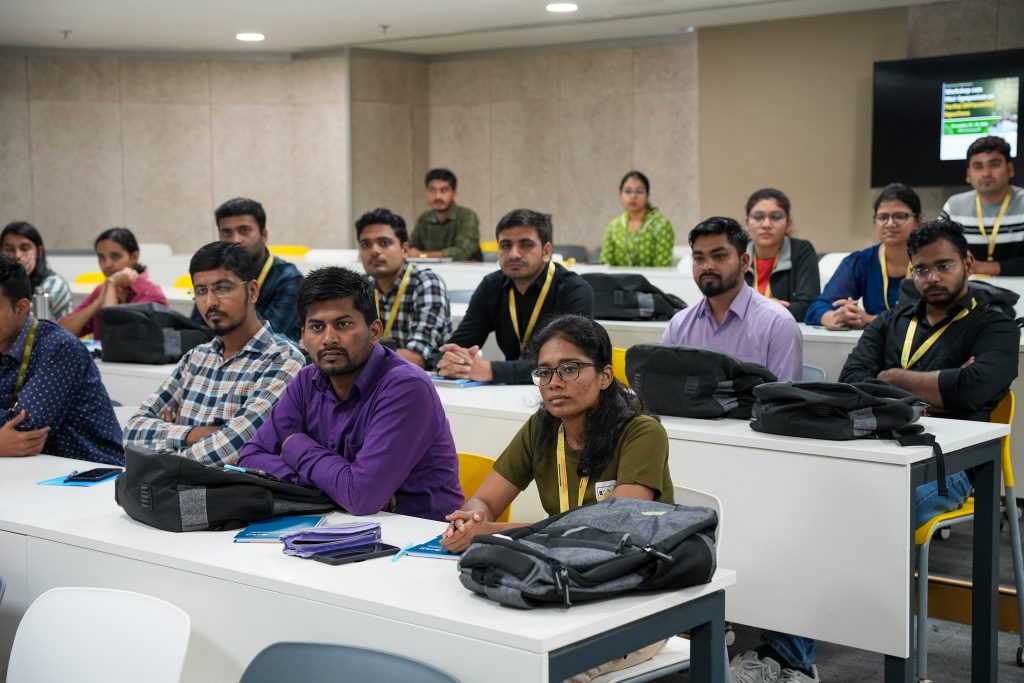
The event witnessed enthusiastic participation from 23 outstation researchers (from reputed institutions across India) and PhD scholars from the Department of Mathematics, SRM AP. The diverse cohort facilitated vibrant academic exchanges and networking opportunities.
A special felicitation ceremony was also held on December 24, 2025, to honour Vigyan Shri Prof. Adimurthi for his monumental contributions to mathematics. This segment underscored SRM AP’s commitment to celebrating excellence in scientific research. The Workshop cum Mini-Symposium served as a dynamic platform for disseminating knowledge, fostering collaborations, and inspiring future research in PDEs.
- Published in Departmental News, Math News, News, Workshop
A Panel Discussion on Decoding the Budget 2025-26

The Department of Economics at Easwari School of Liberal Arts organised a panel discussion titled “Decoding the Budget: Insights, Perspectives, and the Big Picture” on February 03, 2025. The event was designed to provide in-depth insights into the Union Budget 2025-26, focusing on fiscal priorities, economic implications, and sectoral impacts. The discussion brought together distinguished experts from academia and policymaking to analyse key announcements and their long-term effects.
The panel discussion featured three esteemed panellists:
– Prof. Vinish Kathuria (Director, Institute of Development Studies, Jaipur & IIT Bombay) – Expertise: Productivity Measurement, Economics of Regulation, and Environmental Economics.
– Prof. D K Nauriyal (Professor, Department of Humanities and Social Sciences, IIT Roorkee) – Expertise: International Trade, Development Economics, and Economics of Intellectual Property.
– Dr Sujit Kumar (Chief Economist, National Bank for Financing Infrastructure and Development – NaBFID) – Expertise: Banking & Finance, Infrastructure, and the Indian Economy.
The experts analysed the macroeconomic factors influencing the budget, such as inflation control, fiscal deficit management, and global economic trends. The panellists discussed the implications of the budget on critical sectors, including infrastructure, banking, environmental sustainability, and trade policies. The discussion highlighted significant policy changes to boost economic growth and social welfare initiatives. The Q&A session allowed participants to seek clarifications and gain deeper insights into budget-related policies and their long-term effects.
Students, faculty, scholars, and individuals interested in economic policy and financial analysis participate in the discussion. Participants also joined online as the event was in the hybrid mode.
The panel discussion on Decoding the Budget 2025-26 successfully gave attendees a clearer understanding of India’s financial and economic direction. The expert insights helped bridge the gap between budgetary announcements and their practical implications. Students, faculty, and policymakers benefited from the interactive discourse, enhancing their knowledge of economic policies and fiscal governance.
This insightful session emphasised the importance of informed economic discussions in shaping perspectives on national financial policies and governance strategies.
- Published in Departmental News, Economics Current Happenings, Economics News, News






